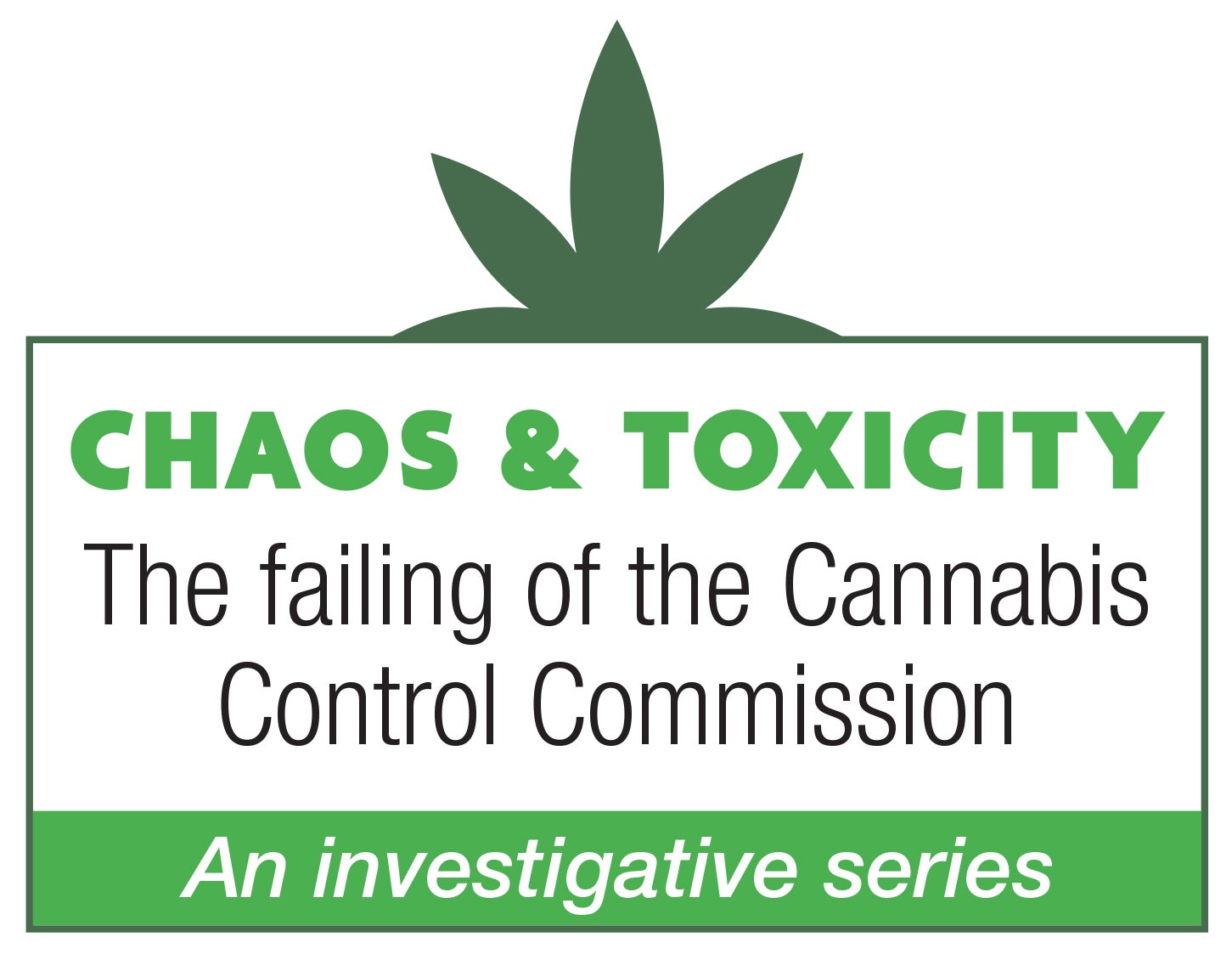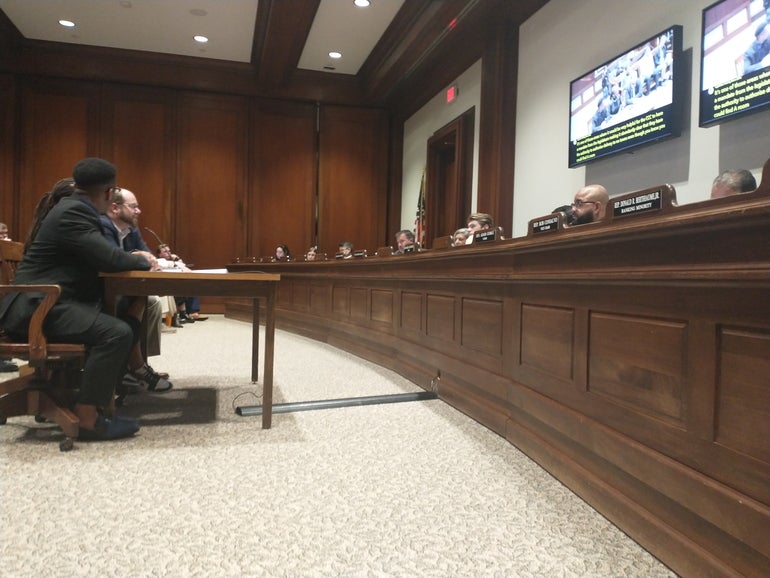As lawmakers met on Beacon Hill Wednesday to discuss potential reforms of the Massachusetts Cannabis Control Commission, the agency’s commissioners were meeting in Worcester to vote on long-awaited changes to the rules governing cannabis deliveries.

State senators and representatives on the Joint Committee on Cannabis Policy held a hearing at the State House to hear stakeholders’ thoughts on the agency’s structure and its impact on the industry, amid serious problems with the commission’s culture and other dysfunction which has hindered its ability to properly regulate the struggling industry. The committee heard from trade associations, business owners, and other advocates, who largely described a commission slow to adapt to the needs of the industry.
“In July, following calls from the inspector general for receivership of the CCC, the House members of this committee released a memo to Speaker [Ronald] Mariano, identifying an opportunity to statutory reform and clarify the CCC’s structure,” Rep. Daniel Donahue (D-Worcester), House chair of the joint committee, said during his opening remarks. “This informational hearing will add that review.”
Speaking after the meeting in response to a question about WBJ’s investigation, which found issues ranging from human resources problems to science-focused staff being unable to access testing data to investigate for potential fraud, Donahue said he believes there could be a legislative fix to these issues.
“We’re reviewing everything we can structurally,” Donahue said. “There’s things within the legislative’s purview that can affect culture or effectiveness in the agency. That’s why we had today’s hearing and we’re going to have more of them moving forward.”
With the CCC-focused legislative hearing beginning just after 11 a.m., the commission was already underway with its third meeting regarding potential regulatory reforms, mostly pertaining to rules governing delivery and transportation of cannabis products.
The commission first voted 3-1 in December to move forward with reforming rules governing deliveries, with much of the focus on the so-called two-driver rule, which requires two employees to be with any vehicle transporting cannabis.
The rule has been the focus of complaints for delivery operators, a type of business license set aside for participants in the state’s social equity program, since before they were even allowed to begin operating in the summer of 2021. Delivery companies and other cannabis businesses involved in transporting products say the rule does little to help public safety while increasing operational costs and difficulties.

CCC’s three active commissioners voted to end the two-driver rule for cannabis delivery companies and testing laboratories — as long as the vehicle is not carrying more than $5,000 in product — while pledging to review removing the rule for all license types at a later date.
The vote also saw the commission make adjustments to delivery operating hours, allow delivery companies to repackage products, tweak rules governing microbusiness and craft cooperative licenses, and make permanent the allowance of the use of telehealth to certify medical marijuana patients, which was first introduced during her COVID-19 pandemic.
“The commission acted diligently to update regulations for constituents while maintaining a safe, equitable cannabis market,” Bruce Stebbins, active chair of the commission, said in a Wednesday press release. “These changes will allow microbusinesses to expand into new parts of the industry and access social consumption licenses in the future. The commission is looking forward to the rollout of the social consumption framework in December, the next major step forward for the industry.”
As regulators were discussing removing the two-driver rule in Worcester, operators were explaining the impact of the CCC’s delay in removing the rule to lawmakers on Beacon Hill.
“While this is a great thing, it’s taken us nearly four years to get here,” Chris Fevry, CEO of Dris Corp., a Natick delivery company, said of the two-driver rule change. “There’s companies going out of business.”
Fevry noted he feels the commission has been listening to businesses more in recent years, but that Dris Corp. has had to lay off employees to stay afloat while awaiting improvements in regulations.
While several speakers expressed a hope the legislature would fully fund commission budget requests to ensure it has the resources to keep up with the growing cannabis industry, complaints about the commission were widespread, with the hearing sometimes veering away from its intended narrow focus on its overarching structure.
Discussions of specific human resource-related issues at the agency were absent and current CCC staff were not invited to testify.
One speaker who took issue with the agency’s behavior was Athol Town Manager Shaun Suhoski, who testified as part of a panel put together by the Massachusetts Municipal Association. Suhoski said trust has broken down between municipalities and the agency, as he’s struggled to gain clear answers to questions regarding the 10 cannabis businesses who are either operational or have applied to open in Athol.
“I have met each of the commissioners that are still active,” Suhoski said. “They’re smart, intelligent, committed, and motivated. They might have disparate opinions, but that’s for the commission to work out. But they need to empower their new executive director of the authority to carry forth a mission to get things flowing through the pipeline.”
David O’Brien, president and CEO of the Massachusetts Cannabis Business Association, said the agency’s independent structure leads to little accountability from the authorities and negative news about the industry stemming from commission infighting has hurt businesses.
“We’ve made so much negative news over the last couple of years, when it comes to the drama and the sort of ‘Game of Thrones’ that go to the agency, it’s not helpful,” O’Brien said. “It’s not helpful to see meetings open with fights over who gets to sit in the chair to [lead] the meeting. That doesn’t help us run our businesses. It doesn’t help them regulate us.”
Back at the Cannabis Control Commission, regulators continue to work to try to clear their plates of potential regulatory changes which have been discussed for years; The agency is slated to hold a listening session on the topic of cannabis testing regulations on Nov. 7, and has planned a discussion on the topic of social consumption establishments for Dec. 5.
Eric Casey is a staff writer at Worcester Business Journal, who primarily covers the manufacturing and real estate industries.

